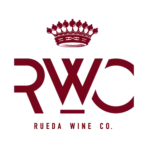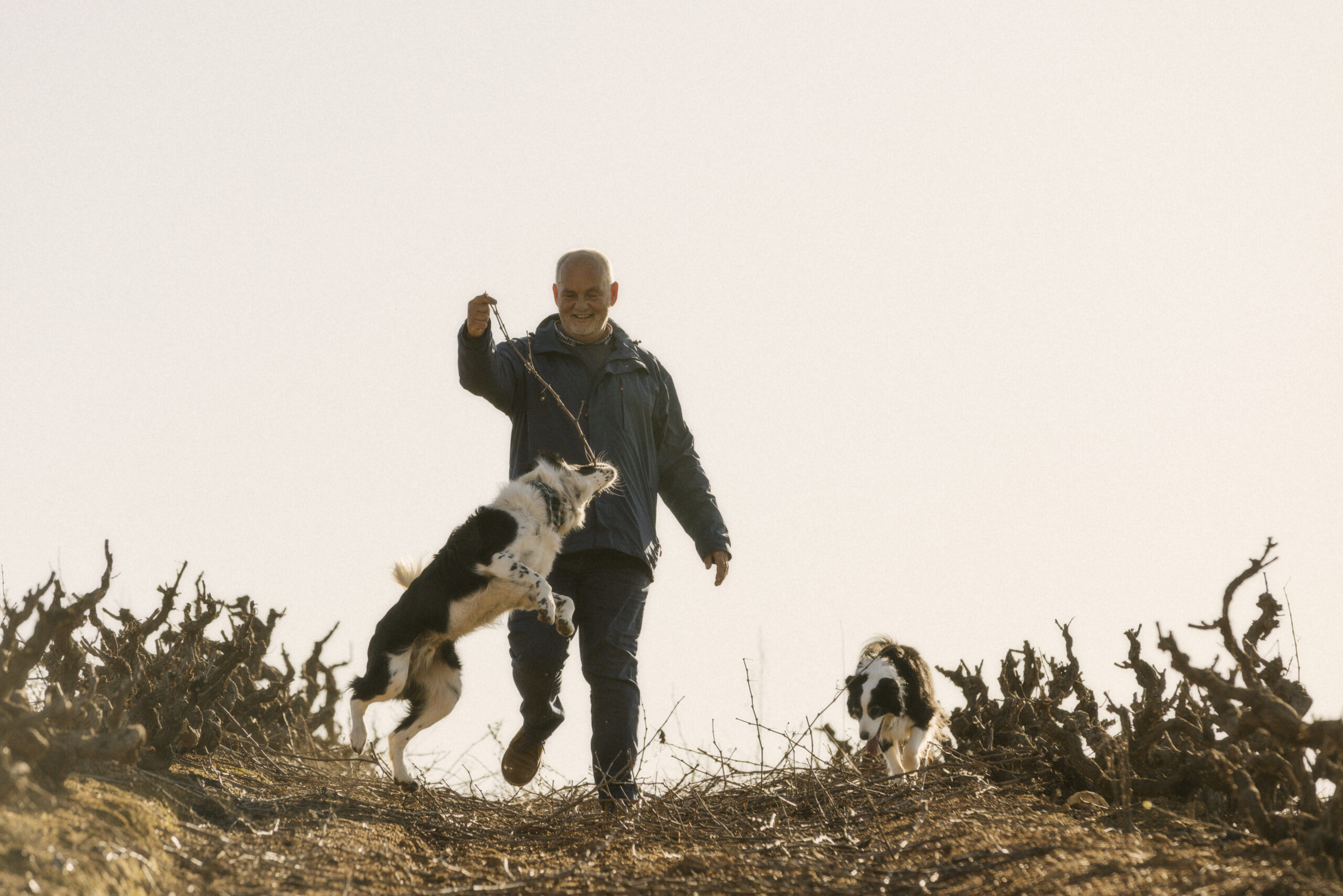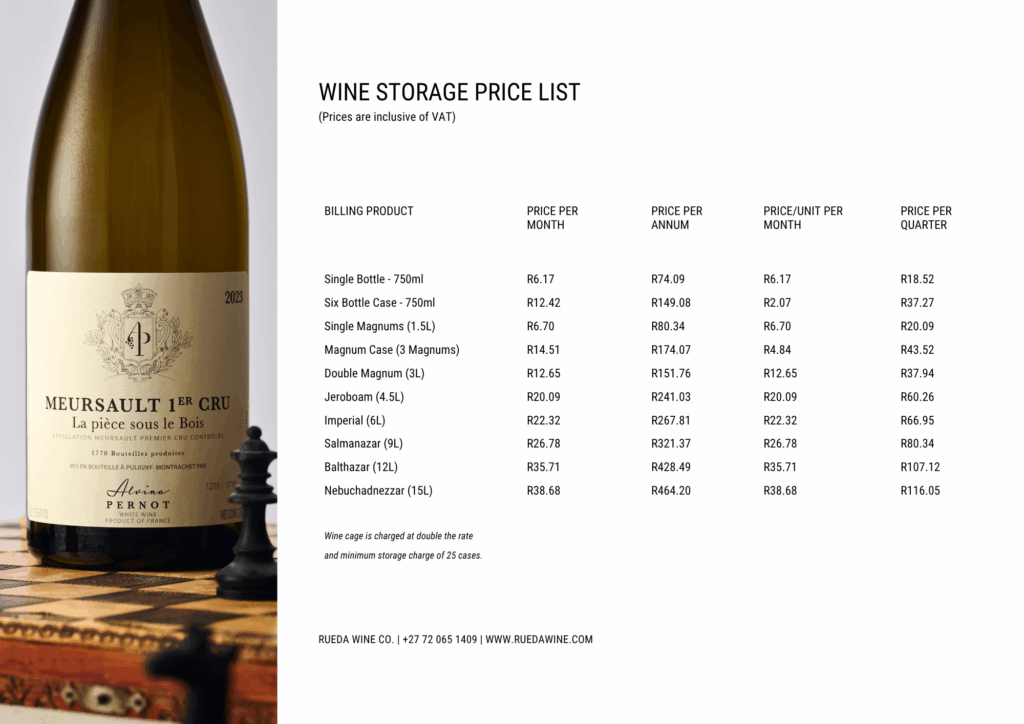Ian Naudé of Naudé Wines has been at the forefront of wine in South Africa, winemaking, and exportation for over 30 years. He’s worked with some of the most esteemed vineyards and companies worldwide, creating dozens of wines. His primary ambition has always been to “craft wines that tell a story of time and place.” He’s been instrumental in introducing wine in South Africa to the world. Obsessed with Terroirs, he celebrates the soil, the grape, the farmer, and the ineffable soul of every wine he makes.
Besides his work with Old Vines and Heritage Vineyards, his mission has always been to distil the essence of the wine farm. “In South Africa, we have kilometres and kilometres of vineyards, so we wanted to do something no one else in the world was doing. Take grapes from different areas, blend, test, and try to make something unique that would grab attention. [It’s like] taking a liquid photograph of a specific ecosystem and putting that in a bottle”.
He was instrumental in the shift from cultivars to Terroirs. Fernando Rueda of Rueda Wine Co. sat down with him in Cape Town to discuss the past and future of wine in South Africa.
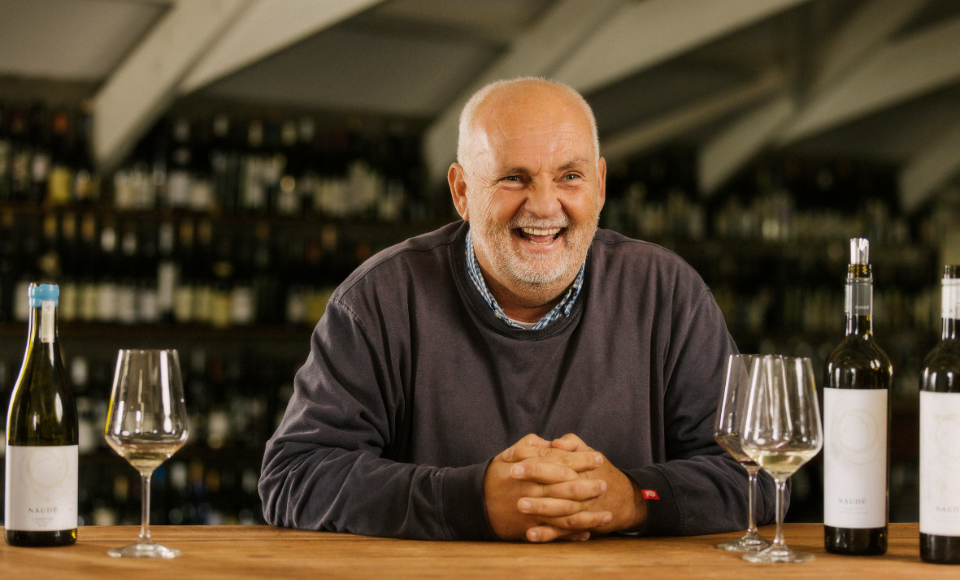
When did you start exporting wine, and why?
We began exporting wine in 1995/96. We started with the Odd Bins crowd at their cheapest price point. I just knew we could do so much more [as a country]. The top wine shops at those times were Odd Bins. There might be three left. There were a bunch of independent, really good wine shops in England, and on our first fact-finding trip, we went to all of them to ask do you have South African wines? They’d say: “Yes, here right at the back is a bottle of Two Oceans.” And we’d find it dusty in the corner at the back of the shop.
We wanted to change that because we knew what wine in South Africa could offer the world.
By 1997, we were exporting consistently, but by the early 2000s, we had our first major victory in moving from the £3 bracket to the £5 bracket, a major confirmation of South African wines in international markets. wine in South Africa took nearly another decade to appear in the £10 to £15 price bracket.
Why were the price brackets important?
We’ll get to that in a second. Let’s step back here. First, England and, more specifically, London are the wine hubs of the wine world. All the influencers, all the writers, all the buyers. I was really lucky to start there because England is where trends start, and then it goes around the globe. London is where all the top writers reside. It’s concentrated there. All the best publications are situated there. New trends have usually started when those trends finally reach South Africa and Australia.
England was sending its wine buyers to South Africa at the time. They’d come out and ask us to make something like a New Zealand Sauvignon Blanc. The same happened with Australian Shiraz and American Chardonnay.
And we’d ask: “Why do you want that? Do you know which continent you’re on?”
They’d laugh and say they had “a mandate from [a big grocery chain that shan’t be named] to get something trendy but cheaper.”
We were flabbergasted. Why would you do that? “Because that’s what sells.”
Before 2000, we never went past £5.99. We were fighting for £3.99 space. Even Meerlust was only sitting at £7.99. We had to start at the bottom to get space at the merchants.
It was worse than that, though. The merchants would put the youngest and most inexperienced buyers into the South African buyer’s role. At the time, though, we’d celebrate getting into Odd Bins and being on their special of 3 for £10 or the Queen’s birthday 4 for £10 special. (Christmas specials, too)
How was wine in South Africa received internationally?
In the 90s, no one wanted South African wines against the European pedigree. We knew the wines we were selling were at least as good as some of the higher-bracketed wines, but we couldn’t break through that ceiling.
Over the years, we tried to sell different things and always wanted to break into the UK and realised we didn’t have anything special. The only ‘special’ thing we had was pinotage. I knew we needed something different, or we wouldn’t move up in the esteem of the trendsetters there.
Is that what brought you to make your own wine eventually?
Yes, but it didn’t happen all at once. I worked worldwide, trying to learn how to make great wines. I tried in America, France, Italy and Germany. I’d work harvests in Europe and then return to work at a South African coop. Back then, if you asked the cellarmasters why they did three pump-overs, because I just came from a farm in France, and they did one. They’d reply: “If we wanted your opinion, we would have told you what it was, so finish the third pump-over and get lost.”
I had this international knowledge and this belief for wine in South Africa, and I also knew that the UK was the place we needed to make it if we were going to have any impact.
So, how did you break in?
Honestly, we had a lightbulb moment. We decided to give them Terroir-driven wines. We started buying grapes from five different Terroirs—five different grapes—fermenting them separately and blending them. Nobody in the world could do that. You can’t blend Burgundy and Bordeaux.
Most regulations don’t allow for that. South African wine regulations didn’t prevent that. We realised we could do something unique. Our strongest point was our Terroirs. You could buy a Stellenbosch grape, mix it with an Elgin and call it a Western Cape.
We have kilometres and kilometres of vineyards, and so we wanted to do something no one else in the world was doing. Taking grapes from different areas, blending, testing, and trying to make something unique that would grab attention. It was a shift from cultivars to Terroirs.
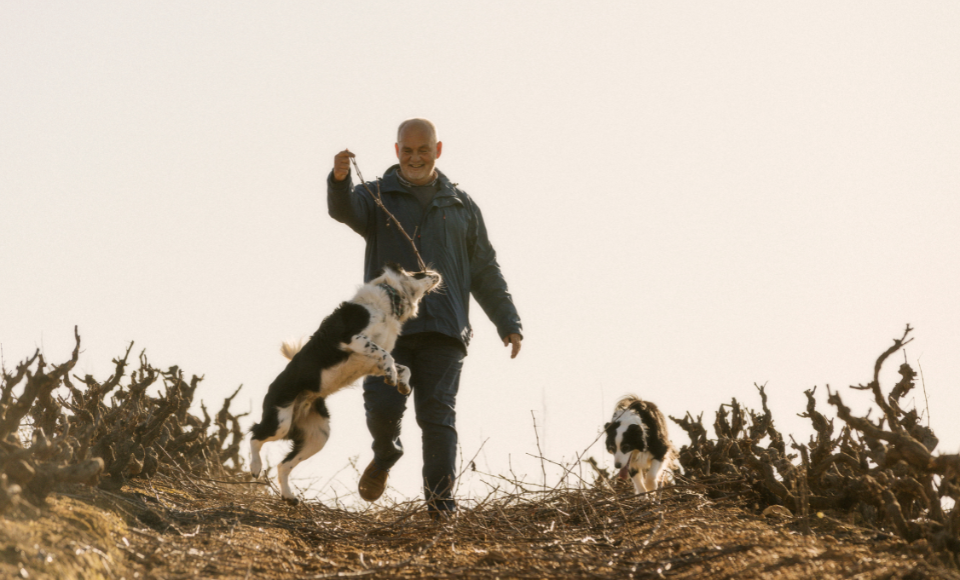
So it was an immediate success?
No! We had a problem because we soon realised nobody in South Africa would buy it. At that stage, a white blend was Graca, so no one wanted to touch it. I wanted to prove that our wines could age. So, in SA, literally, if a wine was two years old, no one wanted it. They thought we couldn’t sell it because it tasted bad. Ageing wasn’t revered. A lack of education. People weren’t exposed to that. They wanted new wine. Fresh vintages. The last nail in the coffin was putting a screw cap on the wine.
We ended up keeping it back, but we couldn’t give it away for free in South Africa. I love screwcaps, but at the time, they were only for cheap wine. This was around 2006 for the first white blend. I worked for a big company, and they didn’t want the blends to reflect on them, so they put it under my name.
Then, I did the Naude white blend, which was more of a French classic. We would invite sommeliers and media people who we had to lure in with free food. (I can give you names if you want).
What was interesting was we did this for five or six years. We wanted to educate the wine writers and try to influence them and generate interest and sales for the wines, but even with all that work, the blends didn’t really sell locally. Nobody bought them. We sat with that stock.
So how did you survive that if the wine wasn’t selling?
I only said it wasn’t selling in South Africa. We were still sending the white blends to the UK. We had a fantastic agent who started selling the blends to restaurants, focusing on the story and the Terroirs and managed to get into several Michelin-starred restaurants in Scotland and a few in London. They started selling well, and the wines got really good publicity.
Then, when I came back to South Africa, people suddenly became interested and wanted to try it. The power of the UK trendsetter. Even now, I’ve only recently started selling the 2010s locally. It does incredibly well in the UK, Germany, and other parts of Europe.
But it was London that put us on the map. After wine from South Africa was accepted in the UK, the other countries followed.
After that, we started to move from the £3-£5 bracket, and the best wines were hitting the ten-pound ceiling. Twenty years on, though, there are £40-£100 bottles of South African wine today. We’re in that class.
How much has the premium wine landscape in South Africa changed over your career?
After apartheid, there were very few of us who began to travel internationally. We were sort of the joke of the industry. The pathetic ones who couldn’t make it here. The whole industry thought we were crazy. There was a structured advancement path. You joined a co-op, became an assistant, and then the wine merchant. Independent winemaking wasn’t much of a thing yet. I got fired about 50 times.
We knew we’d made it when we went to big wine shops like Hedonism, the world’s number one wine shop. You walk in, and on the first shelf, you find South African wine. You’ve risen from the dusty corner to the front of Hedonism.
I found that interesting because we were lucky. We got to see this transformation. And the transformation of South African wine in the global landscape is something that isn’t talked about enough. South Africa has really only been making wine for three hundred years. Older European countries have many vineyards that are in their fourteenth generation, which is nothing uncommon, but in South Africa, if you’ve been doing it for three generations, you’re blue blood. It’s the norm for wine farms to be much older than that.
Who have been the instrumental wine-makers and people who have helped bring wine in South Africa to the world?
There were plenty, but Eben and I were some of the first people to really try bring South African wine to the UK. There weren’t many other people doing it in the 90s; if they were, they were trying in other regions.
Was it hard breaking into new markets after making it in the UK?
A lot easier than breaking into the UK.
Why do you think wine from South Africa has been so successful internationally?
South Africa is known for exciting, quality wines. We’re often the best quality at several price points. We’ve been voted twice in a row the most exciting wine country. We’re at number four overall, I think.
Some producers want to say it’s because their wines are good, but that doesn’t explain our success. Yes, we have good wines, but the whole of the UK is full of good wines. If it weren’t for the expats supporting our wines, we wouldn’t be where we are. Then we have people coming on holiday, tasting the wines here, and taking them home. Some have said it’s like taking a piece of South African sunshine home. A bottle they can open up when the weather is miserable.
The exciting thing is that “South Africa has been the flavour of the month for the last few years”, which never happens. We’ve remained trendy. There are an enormous amount of young winemakers coming up who are pushing the boundaries and making outstanding wine. There are so many amazingly talented winemakers. And we haven’t stalled. It’s not like we found a cape blend, and now we all make it. People are trying different things, and the quality increases every year. This makes our wine exciting to other markets.
Wine is a luxury. It might be a huge market, but South Africa is still young. Are our wines going to last? Well, we’ve crossed a threshold by consistently being considered excellent for nearly twenty-five years. They’ve seen the proof.
Do you think the positive growth RSA wine is on is sustainable? Will it wane?
When is it going to stop? It’s not. We’ve got this new generation coming up, and they will keep innovating. Before, we were stuck with the same cultivars. The cultivars that my generation planted are becoming Assyrtiko, Vermentino, and Verdelho. We’ve got these exciting Terroirs that people are surprised we do in South Africa.
Last year end of harvest, there was a party with more than two hundred interns at these new vintners. It used to be in my generation, we went overseas to Europe to learn, now foreigners are coming here to learn. To see what is exciting and new in winemaking. We’re doing something different, and the world is interested in that.
So, beyond the wine being good, why do you think South Africa has seen so much success internationally at least compared to other regions?
The brand is bigger and more recognisable in the UK. But something happened two years ago, which really made me understand our success. I had a friend who was an excellent winemaker. He noticed that a lot of South Africans were coming up to me and complimenting the wines, whereas he had never had that experience. Not in the same way.
The other South Africans wanted us to win. We would never have been where we are if it wasn’t for the South African expats. They were one of the keys to our success. The expats wanted a taste of home. They showcased our wines to their local friends. At their parties, they’d serve South African wines. We would have been where other wines were in London if it wasn’t for the loyalty and support of South Africans. They fly the flag for us on that side, recommending it, buying it, and showing it off to their friends.
So, this alliance of South African Winemakers isn’t common in other regions?
It’s not a formal thing, but in my experience, it doesn’t happen like that anywhere else. When I sit with Fernando to discuss my wines, we always talk about other South African producers we enjoy and the new wines we’ve tried. Most other producers in other countries don’t do this, promoting their competition, or that’s how they think about it. But that’s what makes South Africa interesting. I want you to try my Colombard, and I want you to try a West Coast Colombard. They’re unique. They’re different Terroirs, and I just want you to try them. But other producers don’t really do that. I rarely see producers at the shows trying to sell one another’s wines.
Can you name a few young winemakers who inspire you and those you believe are taking RSA wine to the “next level”?
[Fernando’s list at Rueda Wine Co.]
Angus Paul – Stellenbosch – Focusing on the heritage South African wine varieties of Chenin Blanc, Pinotage and Cinsault, Angus is producing some of the most exciting and thought-provoking wines from South Africa at the moment.
Sam Lambson – South Coast – The Cape Winelands boast several terroirs of note for Syrah. On the South Coast, one finds Minimalist Wines. Sam Lambson is a Syrah specialist. He is eager to talk about his wines, his trials and tribulations and each vintage in detail. Sam prints a rocket ship on each cork, an ode to the very first batch he produced and a remembrance of the steps of his journey thus far. Stars in the Dark bursts with tannins and flavours, the grapes harvested during a challenging season all the better for their hardship. No Place Like Home is a smaller batch, a sumptuous mélange, the vines thriving in shale and sandstone soils.
Sakkie Mouton – West Coast On the West Coast, Sakkie Mouton endeavours to convey the terroir of Vredendal and the surrounds as earnestly as possible by intervening little and allowing the grape to be the star of the show. Tired of substandard grapes, Sakkie Mouton is on a mission to elevate and exhibit the best of the West Coast.
Tim Hillock – Swartland – In the Swartland, Tim Hillock produces magnificent Syrahs in 2550L Stockinger Foudre and 300L oak barrels, depending on the vintage. His methods are simple and hands-off in the winery. He aims to satisfy his curiosity and love of wine. A Hillock Syrah is all about letting the grapes speak for themselves. Every vintage of the Paradiso Syrahs contemplates the Kasteelsburg mountains, a perfect example of South African schist-grown Syrah.
The list goes on!
Do you have any advice for young winemakers looking to follow in your footsteps?
The biggest challenge for young winemakers will always be competition. And the speed with which trends or phases are hitting the wine markets. Orange wines, flavour of the month wines. Young winemakers should never chase these trends. They need to stick to what they do and their identity and not try to always adapt to what they think the market wants. It’ll change before they can get there. There will always be people who chase trends, but even some of the big producers and farms in the last twenty years became preoccupied with this, [chasing the market], and now they’re gone. Don’t worry about the phases. Make what you do well and stick to that.
Think about if you’re sitting in France, you want a Bordeaux. You don’t want an Argentinian Bordeaux blend. Think about what is really good about your country and do that. I gave my wines Afrikaans names, and people thought I was crazy. But I always thought even though I might not speak Russian, I still buy vodka. That plan worked so well for us.
Do you have any closing remarks on wine in South Africa?
People connect with the story of the wine if it feels like it respects the heritage of the Terroir or the place from which it comes. If you’re selling wine of origin, it has to be honest and respect where it comes from. It gives it more meaning and makes the brand stick out in your mind. In comparison, a marketing name isn’t true. It doesn’t allow you to connect with the wine’s story.
That’s another thing about the young winemakers in SA. They are so honest, and it’s good. SA winemakers help one another. Our winemakers work together. If I sell my wine in London and someone doesn’t like it or thinks it’s too expensive, I’ll recommend other wines I enjoy. And I think SA is unique because almost all the producers do this. They recommend one another’s wines and really care about it. If one South African producer wins, all of us win.
Last piece of advice: “We’re not the rockstars.” Many people think it’s always the winemakers, but we’re not the most important ingredient. It’s the grapes, the vineyard, the region, the Terroirs. They’re the rockstars. You have something special if you focus on showcasing them rather than yourself. Go to a wineshow, and you’ll meet hundreds of brilliant winemakers, but there’s only one or two farms with truly unique soil, grapes, and processes. That’s what makes the wine special.
Cheers!
Written By: Rhett Sinnema
Contributing Content and Interviewee: Ian Naude
Fact Checked By: Fernando Rueda
Edited By: Fernando Rueda
